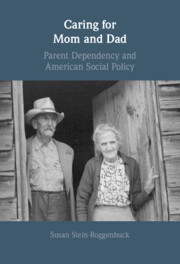4 - Taxing Rewards
Parent Dependency and American Tax Policy
Published online by Cambridge University Press: 07 October 2023
Summary
Federal tax policy offered dependency tax expenditures to taxpayers who helped support their aging parents. This chapter analyzes the 1966 Congressional hearing investigating the adequacy of these federal tax incentives. The hearings occurred during a period of tax reform focused on reducing the number of tax expenditures available through the tax code. The parent’s dependency was not presumed but had to be documented, often resulting in intrusive IRS audits and limited access to benefits. Drawing on letters sent to the committee, this chapter analyzes the voices of adult children and the parents they supported. Their correspondence underscores the hardship that parental support exacted on adult children and their priorities regarding tax benefits for supporting parents. These letters also show the limited options available to parents in need. Relatively minor changes resulted from the hearings, but they illuminate how ideas of dependency and family operated in tax benefits.
Keywords
- Type
- Chapter
- Information
- Caring for Mom and DadParent Dependency and American Social Policy, pp. 156 - 188Publisher: Cambridge University PressPrint publication year: 2023

